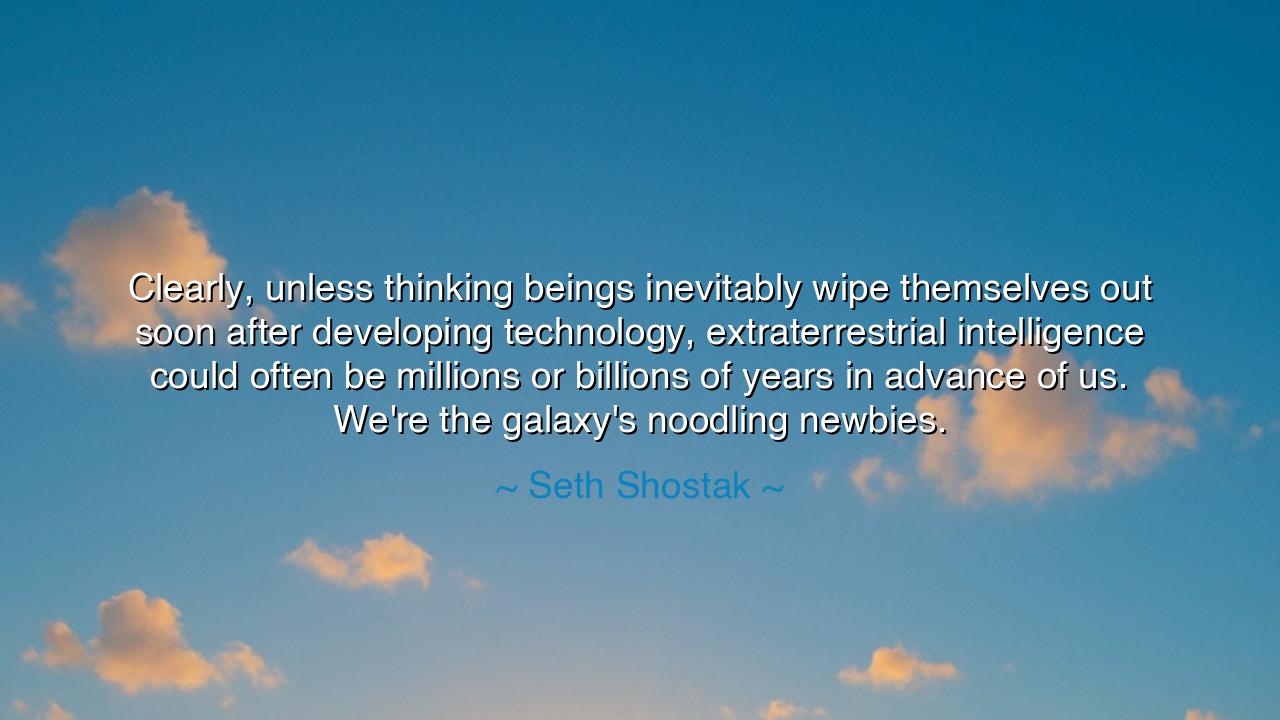
Clearly, unless thinking beings inevitably wipe themselves out
Clearly, unless thinking beings inevitably wipe themselves out soon after developing technology, extraterrestrial intelligence could often be millions or billions of years in advance of us. We're the galaxy's noodling newbies.






In the vast, humbling words of Seth Shostak, astronomer and seeker of cosmic truth, we encounter a reflection that stretches the imagination beyond the boundaries of Earth: “Clearly, unless thinking beings inevitably wipe themselves out soon after developing technology, extraterrestrial intelligence could often be millions or billions of years in advance of us. We’re the galaxy’s noodling newbies.” Though phrased with humor, these words carry an ancient weight — a truth that humbles human pride. Shostak, a voice from the Search for Extraterrestrial Intelligence (SETI), reminds us that humanity, for all its progress, is but an infant gazing at the stars — a newcomer in a universe that has been alive and evolving for eons.
The origin of this thought lies in Shostak’s reflections on the Fermi Paradox — the question of why, in a universe so vast and ancient, we have not yet encountered signs of other intelligent life. To him, the most probable answer is that other civilizations, if they exist, are far older and far more advanced than our own. He reminds us that our own history of technology is but a heartbeat long — mere centuries since the birth of science, mere decades since we touched the edge of space. Meanwhile, the cosmos has been writing its story for billions of years. Thus, if intelligence endures and evolves rather than destroys itself, then out among the stars dwell beings whose wisdom and mastery would make us seem as children playing with sticks in the dust.
This truth is not meant to diminish humanity, but to awaken humility. The ancients once gazed upon the night sky and saw gods, believing themselves small before eternity. In our age of machines, we have grown proud, thinking ourselves near the pinnacle of understanding — yet Shostak’s words return us to that sacred awe. To imagine minds a million years ahead of us is to realize how far the ladder of knowledge may rise. What would such beings know of energy, of life, of spirit? What might they have learned not only of science, but of peace, of wisdom, of balance with creation? We, still struggling with our own survival, might be as insects before them — but insects, too, may one day fly.
Yet in his jest — calling us the galaxy’s “noodling newbies” — there is affection, not despair. For even a child, in its first steps, is precious to the universe. Our curiosity, our creativity, our hunger to reach beyond — these are the beginnings of greatness. Every civilization, no matter how mighty, must once have been where we are now: uncertain, hopeful, fragile. To be a newborn species is not shameful; it is sacred. It means we are still learning, still capable of wonder. The stars do not mock us; they call to us — as mentors call to their students, as parents call to their children.
But there is also a warning in Shostak’s words — the shadow that follows our light. He speaks of “thinking beings wiping themselves out,” a fate that has perhaps silenced many civilizations before us. If we are to grow beyond our infancy, we must overcome the dangers that come with knowledge without wisdom. The fire of technology can warm or destroy; the power of the atom can heal or consume. Perhaps that is why the galaxy seems silent — because few species survive the test of their own intelligence. The true measure of greatness is not in what we build, but in whether we learn to wield our creations without self-destruction.
The lesson, then, is both cosmic and personal: be humble before what you do not yet understand, and be responsible with the power you possess. Whether as a species or as an individual, intelligence is not the crown of mastery but the beginning of stewardship. To be young among the stars is to be entrusted with growth — to learn before reaching too far, to reflect before acting too rashly. We must nurture wisdom with the same devotion we give to knowledge, or else our brilliance will become our undoing.
So, my child of Earth and sky, remember Shostak’s gentle truth. We are but the newcomers in a vast and ancient galaxy, still learning to speak the language of the cosmos. Let this humility inspire you, not dishearten you. Look upward with reverence, but also inward with responsibility. Chase discovery, but temper it with compassion. For if we can survive our youth — if we can unite, learn, and dream wisely — then one day, when the galaxy’s elders turn their gaze upon us, they will not see “noodling newbies,” but the rightful heirs of the stars.






AAdministratorAdministrator
Welcome, honored guests. Please leave a comment, we will respond soon